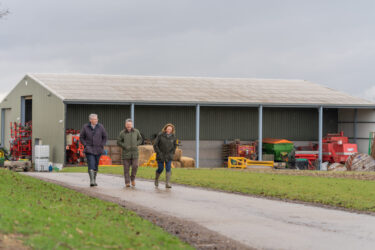Back to Basics on Balfour

Agricultural businesses will be acutely aware of the squeeze on their profits following the phased withdrawal of the Basic Payment Scheme (BPS). This has naturally given rise to an increase in diversification activities, to replace the income BPS once provided and smooth the business cash flows, particularly in poor harvest years.
For some farmers, this will be the first time they have ventured into any business activity outside of farming, and so the Inheritance Tax (IHT) protections that have previously been in place, may start to fall away without careful planning and monitoring.
When the diversification activity is a trade in its own right, this will of course be protected by Business Property Relief (BPR).
However, there is a risk to the IHT reliefs available when farms diversify into investment activities, such as residential or commercial property rentals, DIY livery, furnished holiday lets, or leasing land for renewable projects.
This is where the ‘Balfour’ principles come into play; provided that the various activities are run as one business, and the business, as a whole, is wholly or mainly trading, relief can still be obtained at 100% on both the trade and investment assets.
Wholly or mainly trading
Wholly or mainly trading is considered to mean that more than 50% of the business is focused on trading activities and there are several measures that are considered when determining this. The different measures effectively compare the trading side of the business, to the investment side and if, on the whole, more than 50% is trading, relief should be available at 100% on all assets in the business. However, if in the round, more than 50% is investment activity, BPR would be lost completely. The farmland used for agricultural purposes may still qualify for Agricultural Property Relief (APR), but this only provides relief up to the agricultural value of the land.
The areas considered under Balfour to assess whether the business is looked upon as predominantly trading in the round are as follows:
- Turnover
- Net profit
- Capital value
- Time spent by management and staff
Usually on a typical farm where the diversification activity is a few rental properties, turnover, capital value and time spent will tend to favour the trading side of the business. On the net profit front, particularly in a poor harvest year, the net profit generated from the investment activity can exceed that of the trading activity.
However, failing on one of the metrics would not necessarily mean that business property relief is lost, as again the focus is on the business as a whole.
Important considerations
Firstly, in the case of businesses trading as unincorporated partnerships, it is important to consider who actually owns the business assets. At the outset of a partnership, the founding partners will likely have used land, owned personally to carry out the business activity, but unless this land has been formally introduced into the partnership, IHT reliefs may be reduced or even not available at all. This is where the Land Capital Account within the annual set of accounts becomes a vital piece of evidence for future business property relief claims. Are these up-to-date and accurate? Does this cover all the land farmed in the partnership, or is there land sat off the balance sheet that needs to be introduced? Does this agree with the land stated in the most recent partnership agreement? The importance of having evidence to support that the land is partnership land, rather than land that the partnership has the right to use, cannot be understated.
If potential diversification activities may result in any of the existing land being converted into an investment asset, it is then important to consider if the ownership should remain with the current owner or gifted to say the younger generation prior to the investment activity commencing. In cases where the investment activity may remove a significant acreage from the farm, (say for a solar park) should this be put into a different structure, such as a trust or company? It is critical that these considerations occur well in advance, to ensure the structure is correct from the outset.
Also, when considering diversification into furnished holiday lets and glamping sites, although these are usually classified as trading activities for income tax purposes, they are NOT usually treated as trade for inheritance tax purposes, unless significant additional services are part and parcel of the operation. Therefore, if you believe your diversification activity will be a trade, are you doing enough to ensure it can actually be considered as such, for IHT purposes?
There are other tweaks to business operations that may be appropriate to help support the trading vs. investment activity ratio such as ceasing to let out land on an FBT and farming it in hand under a robust contract farming agreement instead. While this wouldn’t affect the availability of agricultural property relief, it could help tip the scales into the business being a trade, rather than an investment.
Future risks
The now abolished Office for Tax Simplification had been asked to review the current IHT reliefs. As part of their recommendations, they suggested that instead of a business needing to be wholly or mainly trading to obtain BPR on all the assets in the business, it should instead be a much stricter 80:20 test, whereby over 80% of the business would need to be trading in order to obtain the relief. These recommendations were published in 2019 and so before the Covid-19 pandemic. While these proposals have been shelved by the current Government, it would be unwise to assume that the IHT protections which farmers depend on to pass businesses down to the next generation, will not be looked at again, particularly as we approach the next General Election.
If you are considering a diversification activity, please do contact one of the team at Ensors where we will be happy to work with you, to ensure the correct structure and ownership is in place from the outset to maximise the efficiency of IHT and other tax reliefs for your business.

